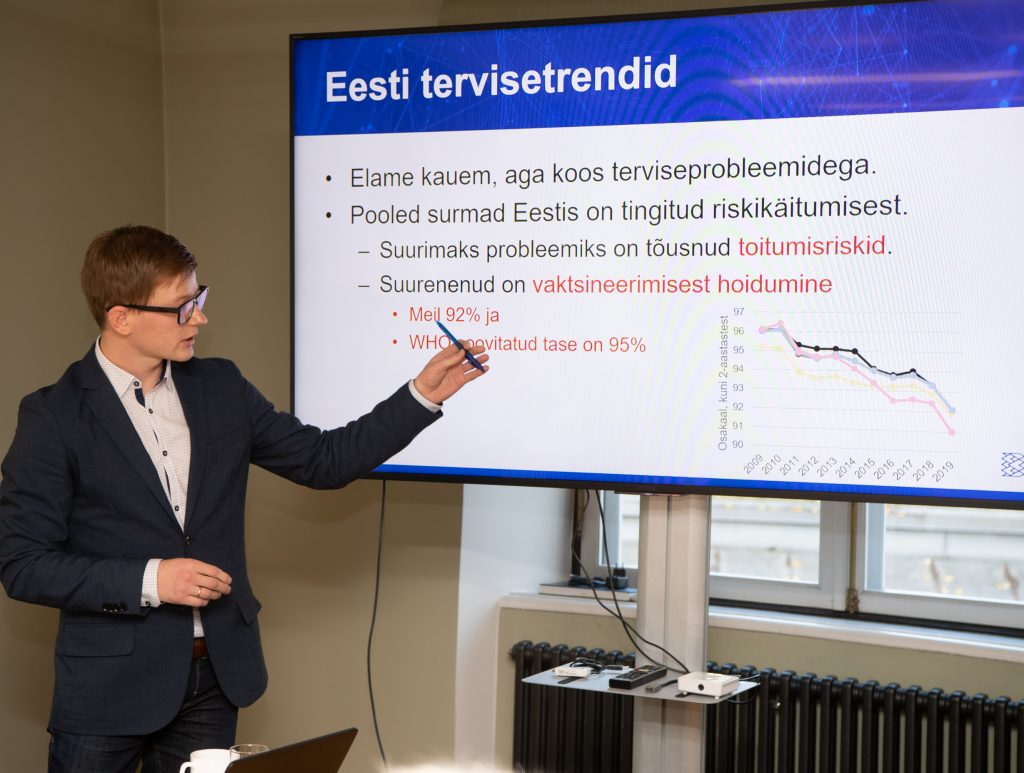The funding crisis in Estonian health care to arrive in five years
The funding crisis in Estonian health care will arrive already in the next five years, the report “Estonian Healthcare in the Future – Key Trends and Exemplary Countries” published by the Foresight Centre today shows. The increase in costs could be slowed down by the improvement of the health behaviour of the people of Estonia and making financing of health care more performance-based.

“The people of Estonia must assume a greater role in taking care of their health and preventing health damage. To achieve this, the state should develop people’s ‘health literacy’ and data-based prevention. Special attention should be paid to people with lower incomes in order to prevent further worsening of health inequalities,” Head of the Foresight Centre Tea Danilov said at the presentation of the report. “Funding crisis in Estonian health care will arrive in the next five years. With the current funding and services, the annual deficit of the Estonian Health Insurance Fund will reach 900 million euro by 2035,” she added.
In the opinion of an expert of the Foresight Centre Magnus Piirits, an increase in healthcare costs is inevitable in an ageing society. “At the same time, improving health behaviour would help to curb the steady growth of costs. We are third in the European Union in terms of obesity – every fifth person in Estonia is overweight. The risks connected with nutrition have become the biggest problem,” Piirits said and added that risk behaviour caused half of the deaths in Estonia.
Analyst of the think tank Praxis Kaupo Koppel said that improvement of health behaviour had to be at the heart of healthcare in the future. “The impact of health behaviour on the expenditure and revenue of the state is greater than the costs of financing new services,” Koppel explained. For example, 51,300 years of life were lost due to alcohol in 2016. If this figure had been only 20% lower, or 40,000 years, the state would see a financial gain of 712 million euro a year. The same potential can be seen in years of life lost due to overweight and obesity, as well as in mental health.
“True, this does not mean that health behaviour alone can solve the emerging financial deficit in healthcare. The efficiency of our medical system is already reaching the point where additional funding is inevitably needed,” Koppel added.
The report “Estonian Healthcare in the Future – Key Trends and Exemplary Countries” provides an insight into the challenges and opportunities of the Estonian health care system until 2035. The report is a part of the Centre’s research on the future of health care and was prepared in cooperation with the think tank Praxis. At the end of November, the Foresight Centre will present the possible development scenarios of the Estonian health care system until 2035.
Foresight Centre is a think tank at the Chancellery of the Riigikogu that analyses long-term developments in society and economy. The Centre conducts research projects to analyse the long-term developments in Estonian society, and to discover new trends and development directions.
Latest news
-
27.06 2025Current low birth rate will lead to up to 1.3 billion euros less tax revenue in the future
In its new short report “The impact of population ageing and low birth rate on long-term state revenue and expenditure”, the Foresight Centre notes that the lower than projected birth rate will reduce government spending on family policy and education, but in the long term, it will mean up to 1.3 billion euros less in tax revenue.

 An independent think tank at the Riigikogu
An independent think tank at the Riigikogu